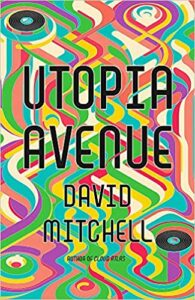 1968 London: the careers of four talented, young musicians are floundering on the rocks. Recognizing their promise, a visionary manager assembles them into a dream band, Utopia Avenue. Will they make it to the top? Or will the fates intervene?
1968 London: the careers of four talented, young musicians are floundering on the rocks. Recognizing their promise, a visionary manager assembles them into a dream band, Utopia Avenue. Will they make it to the top? Or will the fates intervene?
Pros: Crossover from the author’s other novels. Vivid portrayal of the era.
Possible Cons: Mostly soap opera with a secondary speculative fiction element. Disruptive celebrity cameos.
I’ve been a David Mitchell fan for some years and was pleased to run across this novel because the tale overlaps in setting so much with my own novel Harmony Lost. Both describe the travails of a band struggling to make it to the big time, despite demonic possession, personal difficulties, and the music industry’s corruption.
The rickety van, a disastrous first gig at a university, a predatory pass at the female band member — familiar elements cropped up at every turn. Of course, neither David Mitchell nor I are old enough to have experienced 1968 as young adults and were probably mining the same source material. And there are only so many stories one can tell about a rock band coming together.
But I avoided using genuine people in Harmony Lost. First, my interest in historical accuracy is tenuous. And I didn’t want to crowd anybody with my guess of what ‘so and so’ said or did, since some of the relevant people are alive, or if deceased, have surviving relatives and fans. So I set Harmony Lost in an alternate London of 1970, populated by an alternate group of pop stars.
Utopia Avenue, on the other hand, includes cameo appearances by several big-name stars of the late sixties. In each case, the author announced the walk-ons with two repetitions of the star’s full name, and this peculiar repetition bounced me out of the story. And sometimes, I didn’t recognize the famous name and was thrown out of the story while consulting Wikipedia. Also, the star-studded interludes weren’t pertinent to the plot. Most discussed issues of the day or other matters that contributed somewhat to world building. However, I don’t think these episodes were worth disrupting the story’s flow.
I did very much enjoy the weaving-in of elements from several other David Mitchell books. A speculative fiction subplot trickles over from The Thousand Autumns of Jacob de Zoet, and as a speculative fiction reader, I found this plot element by far the most intriguing.
A woman who first appeared in Cloud Atlas captures the heart of one band member. And mostly, Utopia Avenue is a soap opera, crowded with tumultuous love affairs and deaths. One character, thick as a brick and impulsive Dean, creates a fair share of the drama. I found myself skimming the details of Dean’s poor life choices. And I have to say, the novel jumped a shark for me at the second death.
I also page flipped through some descriptions of gigs, drug excursions, and irrelevant chats with famous people, particularly following the resolution of the speculative fiction plot element.
So while I wouldn’t mind a rewrite with more Jasper (perhaps also more Elf, Levon and Mecca) but less Dean. But many readers have and will find the entire book enthralling as written.
